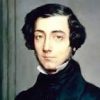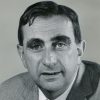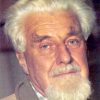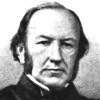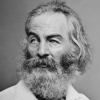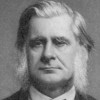And so our kind of imagination is quite a difficult game. One has to have the imagination to think of something that has never been seen before, never been heard of before. At the same time the thoughts are restricted in a strait jacket, so to speak, limited by the conditions that come from our knowledge of the way nature really is. The problem of creating something which is new, but which is consistent with everything which has been seen before, is one of extreme difficulty.
Richard Feynman (1918-1988) American physicist
The Feynman Lectures on Physics, Vol. 2, ch. 20 “Solutions of Maxwell’s Equations in Free Space,” sec. 20–3 “Scientific Imagination” (1964)
(Source)
Quotations about:
hypothesis
Note not all quotations have been tagged, so Search may find additional quotes on this topic.
The whole question of imagination in science is often misunderstood by people in other disciplines. They try to test our imagination in the following way. They say, “Here is a picture of some people in a situation. What do you imagine will happen next?” When we say, “I can’t imagine,” they may think we have a weak imagination. They overlook the fact that whatever we are allowed to imagine in science must be consistent with everything else we know: that the electric fields and the waves we talk about are not just some happy thoughts which we are free to make as we wish, but ideas which must be consistent with all the laws of physics we know. We can’t allow ourselves to seriously imagine things which are obviously in contradiction to the known laws of nature.
Richard Feynman (1918-1988) American physicist
The Feynman Lectures on Physics, Vol. 2, ch. 20 “Solutions of Maxwell’s Equations in Free Space,” sec. 20–3 “Scientific Imagination” (1964)
(Source)
Mistakes are, after all, the foundation of truth, and if a man does not know what a thing is, it is at least an increase in knowledge if he knows what it is not.
A hypothesis which permits the prediction of certain effects that always reoccur under certain conditions does, in its way amount to a demonstrable certainty. Even the Newtonian system had no more than such a foundation.
[Une hypothèse qui permet de prévoir certains effets qui se reproduisent toujours ressemble absolument à une vérité démontrée. Le système de Newton ne repose guère sur un autre fondement. Si en réalité et de l aveu du.]
Alexis de Tocqueville (1805-1859) French writer, diplomat, politician
Letter to De Gobineau (1858-08-05)
(Source)
For with the truth, all the given facts harmonize; but with what is false, the truth soon hits a wrong note.
[τῷ μὲν γὰρ ἀληθεῖ πάντα συνᾴδει τὰ ὑπάρχοντα, τῷ δὲ ψευδεῖ ταχὺ διαφωνεῖ τἀληθές.]
Aristotle (384-322 BC) Greek philosopher
Nicomachean Ethics [Ἠθικὰ Νικομάχεια], Book 1, ch. 8 (1.8, 1098b.11) (c. 325 BC) [tr. Bartlett/Collins (2011)]
(Source)
(Source (Greek)). Alternate translations:With what is true all things which really are are in harmony, but with that which is false the true very soon jars.
[tr. Chase (1847), ch. 6]For with a true theory all facts agree, while with what is false truth is quickly found to conflict.
[tr. Williams (1869)]For while all, experience harmonizes with the truth, it is never long before truth clashes with falsehood.
[tr. Welldon (1892)]For all experience harmonizes with a true principle, but a false one is soon found to be incompatible with the facts.
[tr. Peters (1893)]For with a true view all the data harmonize, but with a false one the facts soon clash.
[tr. Ross (1908)]For if a proposition be true, all the facts harmonize with it, but if it is false, it is quickly seen to be discordant with them.
[tr. Rackham (1934)]For all the data are in tune with a true view, whereas they soon clash with a false one.
[tr. Reeve (1948)]For all things which belong to it are in harmony with a true [definition of it], but truth is soon bound to clash with a false [definition of it].
[tr. Apostle (1975)]Because if a statement is true all the data are in harmony with it, while if it is false they soon reveal a discrepancy.
[tr. Thomson/Tredennick (1976)]For all the data harmonize with the truth, but soon clash with falsity.
[tr. Crisp (2000)]
A fact is a simple statement that everyone believes. It is innocent, unless found guilty. A hypothesis is a novel suggestion that no one wants to believe. It is guilty, until found effective.
Edward Teller (1908-2003) Hungarian-American theoretical physicist
Conversations on the Dark Secrets of Physics, ch. 5 (1991) [with Wendy Teller, Wilson Talley]
(Source)
What certainty can there be in a Philosophy which consists in as many Hypotheses as there are Phenomena to be explained. To explain all nature is too difficult a task for any one man or even for any one age. ‘Tis much better to do a little with certainty, & leave the rest for others that come after you, than to explain all things by conjecture without making sure of any thing.
Isaac Newton (1642-1727) English physicist and mathematician
Opticks, Preface (unpublished) (1703)
(Source)
So we have to make guesses in order to give any utility at all to science. In order to avoid simply describing experiments that have been done, we have to propose laws beyond their observed range. There is nothing wrong with that, despite the fact that it makes science uncertain. If you thought before that science was certain — well, that is just an error on your part.
Richard Feynman (1918-1988) American physicist
The Character of Physical Law, ch. 3 “The Great Conservation Principles” (1965)
(Source)
It is a good morning exercise for a research scientist to discard a pet hypothesis every day before breakfast. It keeps him young.
Konrad Lorenz (1903-1989) Austrian zoologist, ethologist, ornithologist
On Aggression, ch. 2 (1966)
(Source)
When my information changes, I alter my conclusions. What do you do, sir?
John Maynard Keynes (1883-1946) English economist
(Attributed)
Reply to a criticism of having changed his position on monetary policy. Quoted in Paul Samuelson, "The Keynes Centenary" The Economist, Vol. 287 (1983), but possibly apocryphal (see here).
Variants:
- "When events change, I change my mind. What do you do?"
- "When the facts change, I change my mind. What do you do, sir?"
- "When someone persuades me that I am wrong, I change my mind. What do you do?"
Was I to believe him in earnest in his intention to penetrate to the centre of this massive globe? Had I been listening to the mad speculations of a lunatic, or to the scientific conclusions of a lofty genius? Where did truth stop? Where did error begin?
Jules Verne (1828-1905) French novelist, poet, playwright
Journey to the Center of the Earth, ch. 7 “A Woman’s Courage” (1864) [tr. Malleson]
(Source)
Theories are only verified hypotheses, verified by more or less numerous facts. Those verified by the most facts are the best, but even then they are never final, never to be absolutely believed.
I like the scientific spirit — the holding off, the being sure but not too sure, the willingness to surrender ideas when the evidence is against them: this is ultimately fine — it always keeps the way beyond open.
I have argued flying saucers with lots of people. … I was interested in this: they keep arguing that it is possible. And that’s true. It is possible. They do not appreciate that the problem is not to demonstrate whether it’s possible or not, but whether it’s going on or not. Whether it’s probably occurring or not, not whether it could occur.
The inexperienced, and crackpots, and people like that, make guesses that are simple, but you can immediately see that they are wrong, so that does not count. Others, the inexperienced students, make guesses that are very complicated, and it sort of looks as if it is all right, but I know it is not true because the truth always turns out to be simpler than you thought.
Richard Feynman (1918-1988) American physicist
The Character of Physical Law, ch 7 “Seeking New Laws” (1965)
(Source)



